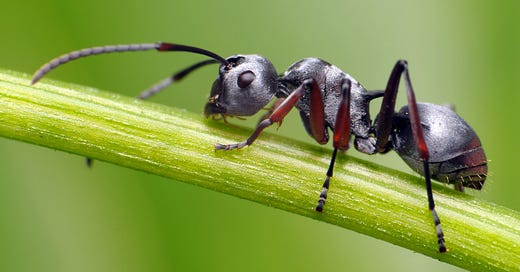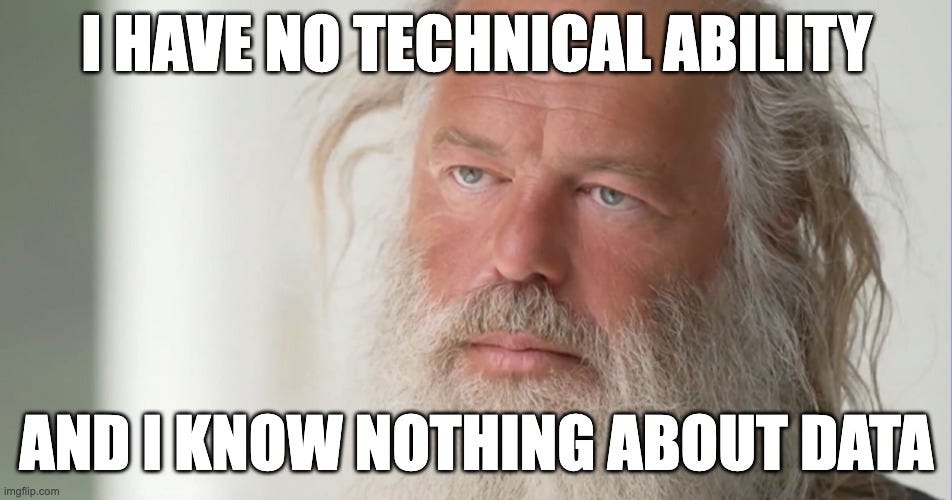I haven’t had as much time to write stories – perhaps work, perhaps laziness. I’m starting this on a 3 hour plane ride, so both those excuses are gone.
I don’t really edit my substacks because of two reasons:
I’m not writing for a magazine
It kills natural flow of thought
Hope it isn’t too distracting for you as a reader.
Introduction
The main premise is simple: imagine there is a species of sentient ants.
These ants are sentient, meaning they can “think” (whatever that means in the ant world), make observations about their environment and infer conclusions about their being in that environment. Part of their sentience is the ability to talk, verbal or telepathic. For simplicity, lets assume that their ability to talk is on the same level as humans.
Like all ants, the sentient ants live in an ant hill.
Defining Dimensions
Dimensions are complex. There are people with way superior knowledge about space-time, how it works, how different dimensions are interlinked, etc. But I think its uncontroversial to say that an ant is a 2D being (length and breadth) with a limited sense of the third dimension (height).
We will round down and call an ant is a 2D being. On the same scale, a human is a 3D being (length, breadth, and height) with a limited sense of the fourth dimension (time). Again, we will round down and call humans as 3D beings. Amoebas are 1D beings, and Gods are 4D+ beings.
The Ant Hill
A life of an ant is simple. It roams around a 2D plane, finds food, marks food for others to fetch and returns to the Ant Hill at night / whatever ants do (I don’t know much about the sleeping and energy schedules of ants).
For an ant, the Ant Hill is the best wonder known to it. Its complex (which it senses because it has a sense of 3D), it is almost infinite, takes a lot of time to build, requires complex coordination among other ants, and more. But ants know there are other ant hills too, by talking to fellow ants they come across in their 2D plane journey.
The Human Scientist
In the world visible to humans, the Ant Hill is on a mound in an environment scientist’s yard. The scientist looks into Ant Hills and studies ant behavior, so doesn’t want to get rid of the Ant Hill and is nice to the ants (gives ants some breadcrumbs, sugar, and ant food).
The scientist, being extremely disciplined has a simple schedule. She wakes up at 8am every day, comes to the yard, gives the ants some food and then studies the ants from afar (to exclude the possibility that her presence is somehow affecting the behavior of the ants). And then when the sun sets around 6pm, the scientist protects the ant hill with a large sheet of water and predator resistant material to protect the ants from nature and other wild animals.
Ant Development
Some time goes on in this setting, and the ants have become quite happy. The Ant Hill is quite developed, every ant has a good ant family, and hence the ants shift focus from food hunting and survival to more exploratory means.
Why do they do so? Because there are no predators challenging the ants (due to The Human Scientist’s help), the ants assume their predators just disappeared. And because they get fed every day, they assume that food is a natural state of being in their universe (which is the 2D plane and the Ant Hill).
The ants first learn writing. For a species to develop, writing is after speech in terms of hierarchy of importance, and the ants recognize that. They document their exploratory efforts, they write stories about the origins of the Ant Hill, about a time before when they had to seek shelter from predators, nature, etc. And then they write about now, an era of unmatched progress, one in which they are living comfortable lives.
These documents become quite popular, and there are many ant readers who eagerly await stories of ants who go out to explore (all ants don’t explore now because they have reached a level of sustenance which doesn’t require that). The ants postulate two Ant Scientific Facts.
The Two Ant Scientific Facts
Ant Scientific Fact 1: Food arrives after the first 3 exploratory parties leave to find food
Ant Scientific Fact 2: All Ant Predators died off before the Great Age, and rain stopped because the Ant Predators died.
The Vacation
All is good until The Human Scientist decides to go on a vacation in July. She’s performed quite well at work and the wants a break, so she flies to Europe. Before leaving, she decides she’ll cover the Ant Hill to protect it from nature and predators but there’s no way she can feed them (she doesn’t trust her neighbors enough to feed the ants because the neighbors have been complaining about the huge ant hill being an eyesore. She decides the ants can fetch food for themselves, so she leaves the ants and hops on her flight.
Day 1
The next day after The Scientist leaves, the ants are puzzled. They don’t get food at their traditional 8am time. This was so common that there was an Ant Scientific Fact (abbreviated to Ant SF from here on) based on this observation.
The ants have become quite lazy and stopped sending 3 parties a long time ago. Now they send one or two parties, sometimes even none, and food still arrived – so they were negligent.
But the ants have stored food for today, so they don’t worry that this might be a problem. And they continue with their day, and think we’ll fetch food tomorrow.
At night, they are still protected from nature and predators, so Ant SF 2 still holds.
Day 2
The next morning, the same thing as the previous day happens and they don’t get food. This causes issues within the Ant community because Ant SF 1 really looks to be up in the air now. The Ant Democratic Council calls all the Ant Scientific experts and discusses things.
Ant Democratic Council, Year 22, Month July.
Ant 1: Why is Ant SF 1 not true?
Expert Ant: This is a new observation, perhaps in these months we won’t get good
Ant 2: Do we need to update Ant SF 1 now?
Expert Ant: I would recommend this – Ant Scientific Fact 1: Food arrives after the first 3 exploratory parties leave to find food, except during the month of July
Fortunately, the ants resume their foraging activities and are able to survive until The Human Scientist returns.
6 months Year Later
The Human Scientist is back from Europe and has been taking care of the Ant Hill quite well for the past 6 months. But its Christmas and she wants to go home (she missed last Christmas after all). So once again, she leaves the protective layers on top of the Ant Hill and goes on vacation.
Day 1 after the Scientist leaves is exactly like last time: the ants are shocked.
Day 2
Ant 1 SF is again in the air and The Ant Democratic Council calls for another meeting.
Ant Democratic Council, Year 22, Month December
Ant 1: Ant SF 1 failed again, Expert Ant. What is going on?
Expert Ant: Don’t know, perhaps it is the year. This year is 22. I think if the year has two 2s in it, we won’t get food.
Ant 2: Well said, Expert Ant. This is the first time we’re seeing two 2s, it must be bad indeed. Let us update Ant SF 1.
Expert Ant: I would recommend this – Ant Scientific Fact 1: Food arrives after the first 3 exploratory parties leave to find food, except during the month of July, and except when the year has two 2s in it.
What the Ants don’t get
There will be more months where The Human Scientist takes a vacation and a point when she decides to move, rendering both laws altogether invalid. The Ant Scientific facts will have infinite clauses, each entangled in a layer of justification that from the outside seems downright comical.
The Ants on the other hand will never realize this. Using their proprietary data driven scientific pursuits, they’ve come to a rational conclusion about their environment. And though this is science to them, it isn’t science and neither is it rational to an outside observer.
A Paradox
If you’ve read this far, I guess you know where this is going. As humans, we have a natural, almost inbuilt tendency to look for patterns. And to extrapolate results. When these extrapolations don’t work as intended, we look back, search, and find issues that we don’t like and blame the failure of extrapolation on it. And some times, we find multiple such reasons.
Very few who’ve accomplished something wonderful in history believed in data. The wonderful sculptures you see, the poems of the Renaissance, the inventions of Tesla, or more recently, Steve Jobs. No one did market research, market sizing, or anything remotely similar.
The paradox is that most processes are mappable by data. This includes historical recollection, law, and drug pathways. So data observation and interpolation has a part, but only in those respects that have little to add to human experience. And the second part of the paradox is most people who don’t believe in data are generally good enough to intuit it
Dimensions Again
Regardless of your religious preference (Simulation vs Gods), hopefully the above example demonstrates that it is difficult / impossible to predict the environment when you’re part of the system / environment (imagine being Price in Call of Duty trying to explain why he respawns every couple minutes). The truth is humans are at the same level.
Now, does that make a difference to the average person’s life? No.
Does that make a difference to data scientists predicting weather / drug effects / similar? Also no.
Does that make a difference to those looking to create something that is radically unique? Yes. Data is not going to give you some amazing insight / product thought that no one’s had before. You could definitely create the nth b2b saas firm with data, but lets be honest here, no one remembers which company made the most revenue in 2007. We only remember the iPhone.
On Luck
Whenever someone comments on someone who’s made it big, they often quote one factor: luck. Luck means different things to different people and it is a futile exercise to attempt to define it. But I think most people can agree that luck is something that can not be predicted or defined by data.
Luck is something that just happens. Very much so like revolutionary events and products, they just happen. Is it luck or is it something else? There is a very strong argument to be made here for religion here, or for higher dimensional actions or “stories” we as humans don’t really have access to. What we can do is observe them, and like the ants, create custom cases for these events to continue our belief in the world’s rationality.









